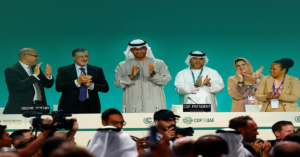Physical Address
23,24,25 & 26, 2nd Floor, Software Technology Park India, Opp: Garware Stadium,MIDC, Chikalthana, Aurangabad, Maharashtra – 431001 India
Physical Address
23,24,25 & 26, 2nd Floor, Software Technology Park India, Opp: Garware Stadium,MIDC, Chikalthana, Aurangabad, Maharashtra – 431001 India

Today marked the conclusion of COP28, culminating in a historic accord embraced by 198 parties, ushering in a new era of climate action.
The parties have officially endorsed a groundbreaking document named “The UAE Consensus,” outlining an ambitious climate agenda geared towards maintaining the feasibility of limiting global warming to 1.5°C. The UAE Consensus urges Parties to shift away from fossil fuels in order to achieve net-zero emissions, calls for the submission of economy-wide Nationally Determined Contributions (NDCs), establishes a fresh target to triple renewables and double energy efficiency by 2030, and propels the trajectory towards a revamped framework for climate finance.
Derived from a year of comprehensive diplomatic engagements and two weeks of rigorous negotiations, the UAE Consensus mirrors the COP28 Presidency’s commitment to crafting the most ambitious response to the Global stocktake while staying true to the core objectives of the Paris Agreement.
In his closing remarks, COP28 President Dr. Sultan Al Jaber expressed, “The world needed to find a new way. By following our North Star, we have found that path. We have worked very hard to secure a better future for our people and our planet. We should be proud of our historic achievement.”
Dr. Al Jaber emphasized the unique approach of COP28, bringing together diverse stakeholders—private and public entities, civil society, faith leaders, youth, and indigenous peoples. He underscored the unity and collective action that characterized the entire process.
Throughout the COP28 proceedings, Dr. Al Jaber and the COP28 Presidency team consistently emphasized their commitment to developing “a plan that is led by science” and establishing a new paradigm for current and future COPs, one that prioritizes the inclusion of diverse voices and addresses the needs of the Global South.
Dr. Al Jaber remarked, “It is a balanced plan that tackles emissions, bridges the gap on adaptation, reimagines global finance, and delivers on loss and damage. It is built on common ground, strengthened by inclusivity, and reinforced by collaboration. It is an enhanced, balanced, but make no mistake, historic package to accelerate climate action.”
Key commitments outlined in the final negotiated text encompass: